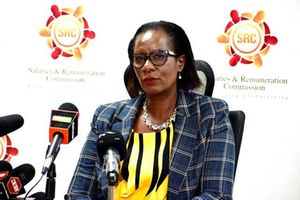Kuppet warns govt over teachers' pay as Musalia calls for patience

Prime Cabinet Secretary Musalia Mudavadi cuts a cake during Kuppet’s 25th anniversary celebrations at Moi International Sports Centre, Kasarani in Nairobi on Saturday, December 16. He is flanked by Kuppet secretary general Akelo Misori.
What you need to know:
- Kuppet’s Akelo Misori says teachers work under deplorable conditions, compounded by meagre salaries.
- CBA negotiations for between 30 to 70 percent increment were thwarted by Covid-19.
Teachers will next year agitate for a salary increment of between 30 and 70 per cent, the Kenya Union of Post Primary Education Teachers (Kuppet) has said.
The union’s Secretary General Akelo Misori put the government on notice, arguing that the teachers’ current pay is meagre and hardly enough to sustain them.
He was speaking at Kuppet’s 25th annual delegates conference in Nairobi, whose chief guest was Prime Cabinet Secretary Musalia Mudavadi.
“In 2024, we must ask the government to open up this addendum which gave us only seven to 10 percent to make us realise between 30 and 70 percent pay increase,” Mr Misori said.
In his speech, Mr Mudavadi called on the teachers to be patient with the Kenya Kwanza administration that is faced with a giant of rumbling economy, forcing it to make “extremely” difficult decisions to pull the financial system out of the turmoil.
“It will take us a bit of time because defaulting is not an option. We are likely to see a difficult two to three years as a nation before we start seeing reprieve. But there is hope at the end of the tunnel,” Mudavadi explained.
“When you are in a difficult situation, you are sometimes forced to make extremely painful and difficult decisions.”
The Prime CS implored the teachers and other Kenyans to support the regime “to make this tough decision so that we can have more resources to go to the education of our children and to go into your pockets as better salaries as we move forward”.
However, the union warned of an impending industrial unrest should the Salaries and Remuneration Commission (SRC) be left to have the final say on teachers’ salaries.
Mr Misori said leaving the mandate to SRC is akin to usurping the powers of the unions. “We are aware that there is the existence of this monster called the SRC. But if this monster is allowed to dictate and usurp the powers of the unions to negotiate, then you will have a lot of industrial unrest. We must begin giving the CBA negotiations a chance.”
The renewed push for salaries review, Kuppet said, is anchored in the Collective Bargaining Agreement (CBA) of 2016-2021, which led to some of the coveted high pay rises for institutional managers. However, they argued that the CBA fell short of bagging an increment for teachers in the various cadres.
In 2019, the unions presented their salary increase proposals to the employer ahead of CBA negotiations, but their demands were never met after they were disrupted by the Covid-19 pandemic, leading to the cashless CBA. The Kuppet was demanding a 30 to 70 percent pay rise, with the Kenya National Union of Teachers (Knut) asking for 60 percent.
Kuppet secretary general said the vigour to negotiate with their employer – the Teachers Service Commission – was ordained by the former President in 2016.
“We cannot afford many of the basic needs. We cannot take our children to the same schools where we teach because the salaries that we currently earn is really subjected to very serious statutory deductions and taxes which are a real burden,” Mr Misori lamented, adding that in the following year, the union will be calling for an expanded CBA.
Further, Mr Misori said that teachers are working in deplorable conditions, urging the State to improve the infrastructure in schools.
Following a deal signed between TSC and the unions in August 28, teachers were meant to earn more by between seven and 9.5 percent, with the highest percentage increase given to the lowest paid teachers.
The deal was to be backdated to July 1, 2023 and spread over two years, but the unions said they would press on with their earlier demands. It was to include increases in their basic salaries and housing allowances for rural teachers, who form 87 percent of the (teacher) population.





